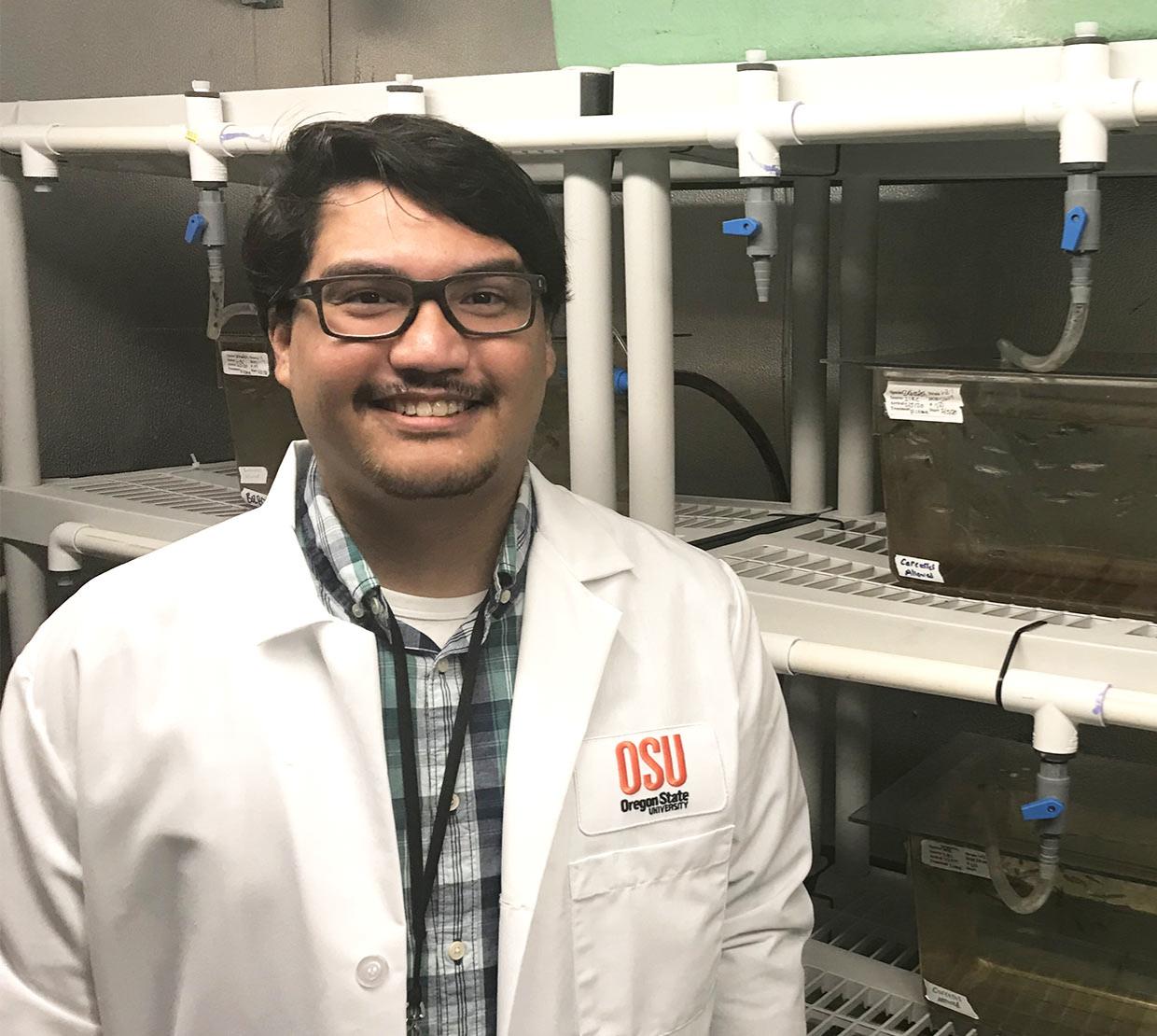Microbiology Ph.D. student Corbin Schuster’s interest in biomedical research – particularly the study of microorganisms and infectious diseases – kindled during his 10-week internship at the National Institute of Diabetes and Digestive and Kidney Diseases in Bethesda while he was still an undergraduate at Heritage University in Washington state.
Today Schuster works with Professor of Microbiology Michael Kent in the Kent Lab to uncover the effects of the three most common infections in zebrafish and develop methods to prevent or control those diseases. He is supported by the National Institutes of Health (NIH) Office of Research Infrastructure Programs through the program Research Supplements to Promote Diversity in Health-Related Research connected with Kent’s National Institutes of Health (NIH) grant, “Control and Impacts of Diseases in Zebrafish Research Facilities.” The highly productive Kent Lab is focused on two major research areas that shed light on chronic infectious diseases: diseases of zebrafish in research facilities and the impacts of pathogens on wild salmonid fishes.
"Dr. Kent keeps me motivated and gets me out of my comfort zone, whether it’s taking on leadership roles, talking about my project and results – even when they’re not what I expected, or influencing me to get involved in diversity activities on campus ..."
As a member of the Yakama Nation, Schuster is interested in the study of human diseases that have a higher incidence among Native peoples, such as toxoplasmosis (a parasitic infection), as well as diseases of salmon, which are central to the food, culture and religion of the Yakama people.
“[The grant provided] a unique experience in that I don’t feel that I have to separate my culture from my career. I’m really interested in working with the tribal community, and the program and the NIH both support that aspect of my research desires,” said Schuster, who is in the third year of his Ph.D. program.
His interest in the zebrafish model was sparked when he learned about the aquatic model’s use in studies of spinal cord regeneration. “I really saw the discoveries that we could possibly have with zebrafish. When I started looking at the genetics [of the model], it was even more mind-blowing,” he explained.
Schuster currently is developing a sensitive and specific nonlethal water test to detect a common parasite in zebrafish, Pseudoloma neurophilia. He also is using histology and molecular biology methods (polymerase chain reaction) to characterize disease transmission dynamics in fish. His research is important to the rigor and reproducibility of studies using zebrafish models because P. neurophilia occurs in about 50 percent of zebrafish research laboratories. Kent’s laboratory previously showed that subclinical infections of P. neurophilia in laboratory zebrafish may have implications for research outcomes as a confounding factor, especially in neurobehavioral research.
He also has the opportunity to work with the Oregon Veterinary Diagnostic Laboratory (OVDL) at OSU, which collaborates with Zebrafish International Resource Center where Kent is a co-investigator, to provide diagnostic services to the zebrafish research community. Dr. Justin Sanders, head of molecular diagnostics at OVDL, leads molecular diagnostics and also mentors Schuster, providing guidance regarding molecular aspects of Schuster’s research.
Schuster’s grant allows him to mentor undergraduate students in the laboratory, a role that Kent encourages. He also is involved in outreach to students in his hometown area, including those in tribal communities, to encourage their involvement in science careers.
“Dr. Kent keeps me motivated and gets me out of my comfort zone, whether it’s taking on leadership roles, talking about my project and results – even when they’re not what I expected, or influencing me to get involved in diversity activities on campus, including sharing concerns about decision-making as they relate to diversity,” Schuster said.
Schuster is preparing to submit his first peer-reviewed manuscript on his research with his mentors this year.




